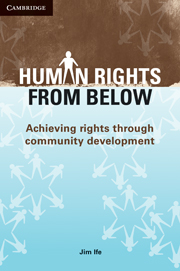Book contents
- Frontmatter
- Contents
- Acknowledgements
- Introduction
- Part 1 Thinking about community development
- 1 Definitions and imperatives of community development
- 2 Principles and dimensions of community development
- Part 2 Thinking about human rights
- Part 3 Bringing human rights and community development together
- Part 4 Enacting human rights from below
- Appendix: The human rights matrix
- References
- Index
1 - Definitions and imperatives of community development
Published online by Cambridge University Press: 05 June 2012
- Frontmatter
- Contents
- Acknowledgements
- Introduction
- Part 1 Thinking about community development
- 1 Definitions and imperatives of community development
- 2 Principles and dimensions of community development
- Part 2 Thinking about human rights
- Part 3 Bringing human rights and community development together
- Part 4 Enacting human rights from below
- Appendix: The human rights matrix
- References
- Index
Summary
DEFINITIONS
COMMUNITY
Although the word ‘community’ is commonly used and generally has positive connotations, the term itself is problematic. It is used in many ways (Bauman 2001, Chile 2007, Bryson & Mowbray 1981, Ife 2002, Ife & Tesoriero 2006, Kenny 2006). Before we start making sense of the idea of community development, therefore, we need to examine the idea of community itself. Just what is it that we are aiming to ‘develop’? When we examine the following usages of the word ‘community’, we find that it conveys a variety of meanings:
community care
the Australian community
a community centre
widespread community debate
the academic community
the Google Earth community
the Muslim community
the needs of the local community
consulting community representatives
the global community
community mental health
community grassroots initiatives.
A word used in so many ways defies strict definition. It is more appropriate to think, instead, about all the meanings that it has in its different contexts. Ultimately, ‘community’ is subjective. It means what the person using the word decides it will mean. It is therefore important to look at this constellation of meanings.
The first thing to note is the positive connotations that the word ‘community’ has for us. Community is generally seen as a ‘good thing’: as something to be valued or desired. Although there can be no doubt that communities have been and can be oppressive, this negative view is usually far outweighed by the good feelings the word seems to generate.
- Type
- Chapter
- Information
- Human Rights from BelowAchieving Rights through Community Development, pp. 9 - 28Publisher: Cambridge University PressPrint publication year: 2009



